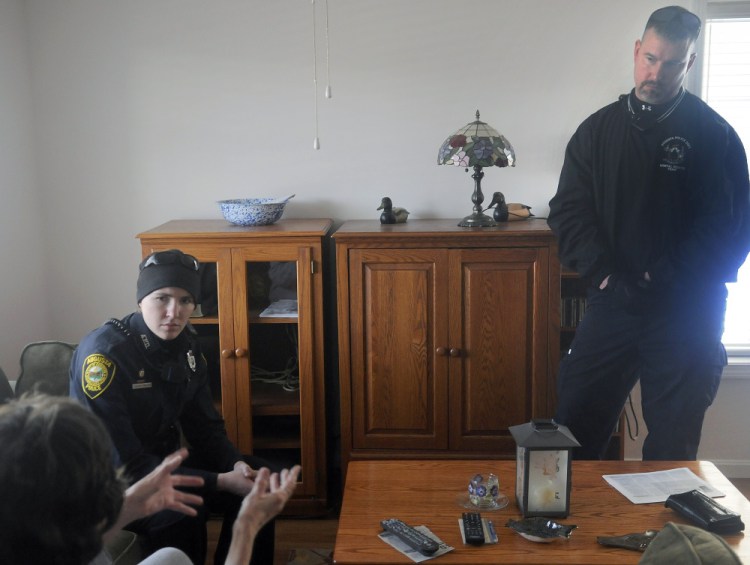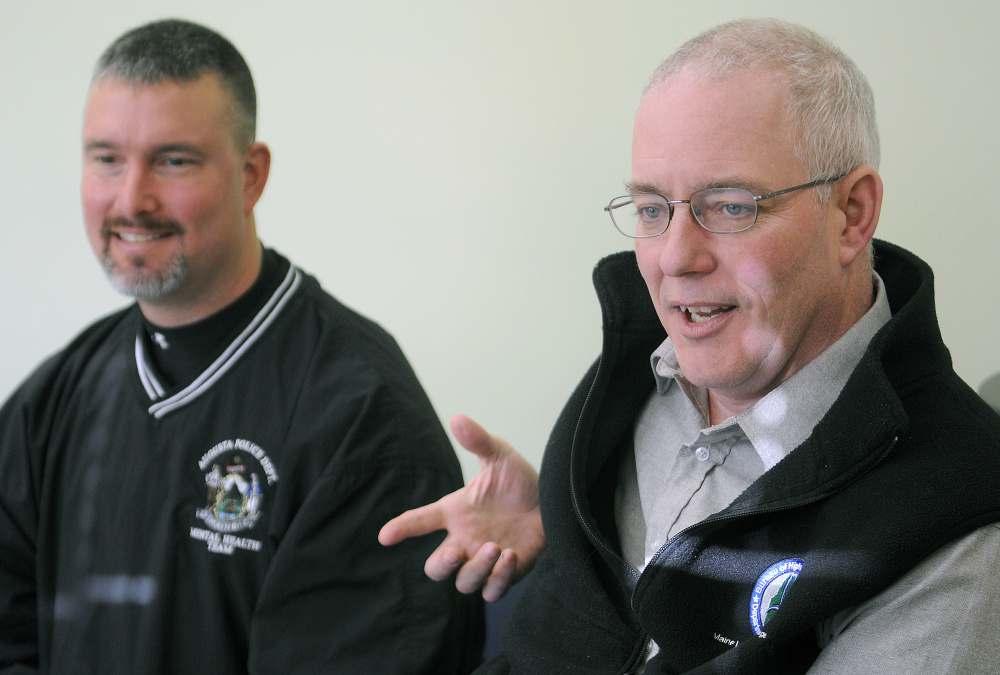AUGUSTA — Greg Smith has been back with the Augusta Police Department for nearly six months. How long he’ll get to stay remains to be seen.
Smith, the department’s Intensive Case Manager, works full time with patrol officers in the community. While much of his time is spent helping the officers work effectively with people suffering from various mental health problems, Smith’s specialty is helping people experiencing a mental crisis, whether or not they have a diagnosed illness.
“He’s there to intervene prior to a full-blown crisis,” Augusta Police Chief Robert Gregoire said.
Smith, 43, worked as the department’s Intensive Case Manager for nearly 14 years until the Maine Department of Health and Human Services cut funding for his position in August 2012.
He returned in August of last year after Riverview Psychiatric Hospital officials opted to include funding for the position in the hospital’s budget. Gregoire said Riverview Superintendent Jay Harper funded the position after attending city council meetings and hearing first hand of its importance.
“He took the steps necessary to put it back in place,” Gregoire said. “It’s a great thing for the community.
But that funding runs out in August. Neither Smith nor Gregoire knows if the position will be included in Riverview’s next budget.
Police and city officials have appealed to Harper to maintain funding for the position. Harper did not respond to messages seeking comment.
“It was a great 14 years that we had Greg,” Gregoire said. “It was a significant loss when he left. We hope to have him back for a long time.”
Smith’s work is particularly important in Augusta where there is pronounced impact from Riverview patients. The city is the hub for Riverview’s out-patient services catering to people living in the community. Augusta also is a center for social services catering to scores of others who have been diagnosed with a mental illness. Gregoire said the greater Augusta community, which includes towns immediately surrounding the city, has about 5,000 people with mental illness regularly seeking service here.
“These are not just the people you see walking the streets,” Gregoire said. “These are people who have jobs and families who have mental health issues.”
Police officers receive training to work with people experiencing psychological and mental distress, Gregoire said. It is a regular, if not daily, part of the officers’ jobs. Police are often pushed to the front lines of mental health work, Gregoire said, because a person experiencing a crisis might not seek help on his or her own, but a neighbor who notices erratic behavior is likely to call police.
“Greg, every shift, deals with somebody. Every shift we do,” Gregoire said. “We’re more likely to do a better job with Greg.”
But the primary role of police is to enforce the law, Gregoire continued. Police departments are ill equipped to connect mental health patients with needed services.
“It’s not a criminal matter,” Gregoire said. “It’s a mental health matter.”
Moreover, privacy laws often create a communications barrier between law enforcement and social services. That’s where Smith comes in. He works closely with law enforcement, yet because he works for Riverview, he has access to information and links to programs that police do not. Maintaining that connection is one of the primary reasons the city cannot simply keep Smith in the fold by funding his position, Gregoire said.
“Greg is a great conduit to that social service system,” he said.
“I’m an instrument for resources and referral,” Smith said. “I’m an advocate.”
Smith also brings an expertise in working with people with mental health problems.
“We are not trained mental health workers,” Gregoire said. “We aren’t trained advocates. We try to do what we can with the training and the abilities we have, but I think Greg is a great help to us. We can do a better job with Greg’s abilities.”
Smith’s presence has a compounding effect on the department. As he rides with various officers, particularly the newer ones, Gregoire said they learn from Smith’s techniques and become more effective when he is off the clock or working with another officer. Smith said he and officers give each other constant feedback about approaching everyone with whom they interact, not just those with mental illness. Smith said it is satisfying to see “bits and pieces” of his approach and techniques coming out in other officers.
“Augusta Police Department, as far as agencies in the state, is probably one of the best developed agencies in terms of dealing with this,” Smith said.
Ideally the department would have a case manager like Smith working every shift, but for now Gregoire would be happy if Smith’s position was made permanent. Ultimately, Gregoire said, it would be money well spent.
“If Greg can intervene, we can save a lot of resources for our organization, the hospital and these other social service programs in the city,” Gregoire said. “I think it’s a money saver in the long run, and I think it provides better service in the community and the consumers out there.”
Craig Crosby — 621-5642
Twitter: @CraigCrosby4
Copy the Story LinkSend questions/comments to the editors.




Success. Please wait for the page to reload. If the page does not reload within 5 seconds, please refresh the page.
Enter your email and password to access comments.
Hi, to comment on stories you must . This profile is in addition to your subscription and website login.
Already have a commenting profile? .
Invalid username/password.
Please check your email to confirm and complete your registration.
Only subscribers are eligible to post comments. Please subscribe or login first for digital access. Here’s why.
Use the form below to reset your password. When you've submitted your account email, we will send an email with a reset code.